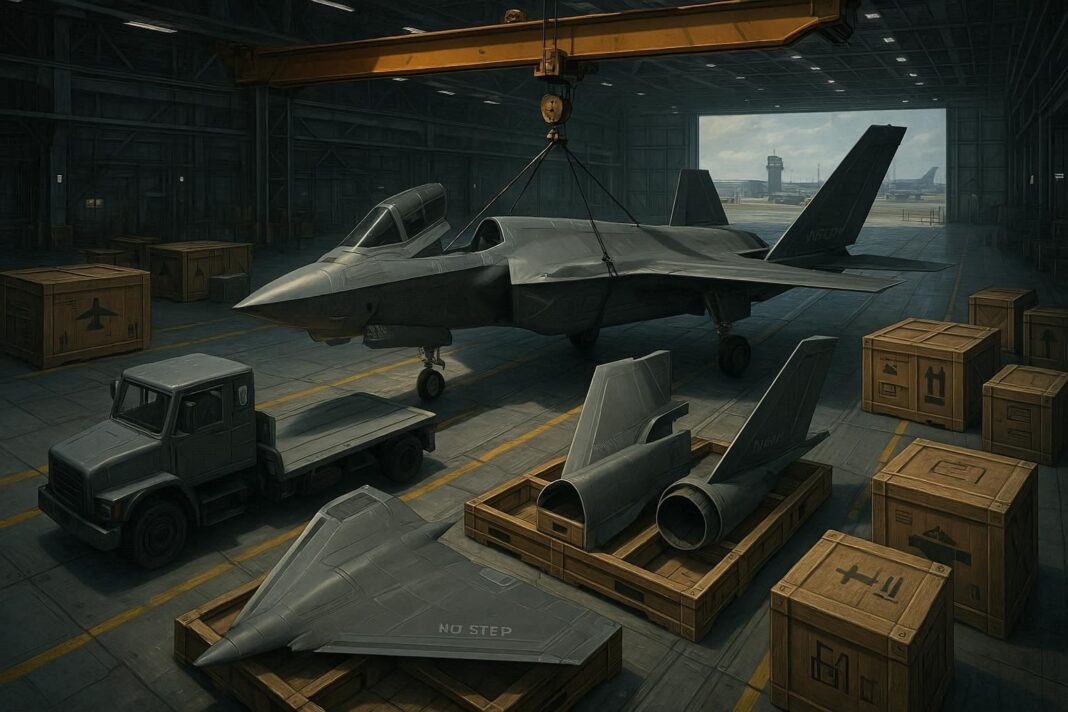At a recent Senate estimates hearing, defense officials were pressed to clarify reports that F-35 parts were allegedly sent from New South Wales to Israel. The issue has raised concerns among lawmakers and the public due to the ongoing conflict in Gaza.
Defense Officials Face Tough Questions Over F-35 Parts
Reports indicate that Australia transported at least 68 shipments of F-35 parts to Israel between October 2023 and September 2025. These F-35 parts form part of a global supply chain that allows countries in the program to access components for maintenance and sustainment.
Officials emphasized that the United States owns the F-35 parts and that US weapons manufacturer Lockheed Martin manages them. They clarified that Australia does not manufacture the parts for direct export but contributes to the global supply chain. According to the Department of Defense, Lockheed Martin coordinates the movement of these F-35 parts between countries to support F-35 fleet maintenance.
Dutch F-35 blasts Russian drone near NATO border — Europe on edge as skies turn volatile
During the hearing, senators questioned shipments originating from RAAF Base Williamtown, located 30 kilometers north of Newcastle. The base serves as a regional hub for F-35 parts maintenance. Shipping records show that Australia picked up an inlet part for an F-35 at Williamtown in September 2025 and delivered it to Israel after transshipping it through Bangkok.
Defense officials, however, said they cannot confirm whether Australia issued any export permits for these F-35 parts. They stressed that, although the parts pass through Australian facilities, the United States and Lockheed Martin control the global supply chain.
Australia’s Role in the Global F-35 Parts Supply Chain
Australia participates as one of several countries producing components for the F-35 fighter jet. More than 70 Australian companies manufacture F-35 parts that support the global fleet, including key components such as uplock actuator systems, which control the bay doors of the jets.
Although Australian companies manufacture the F-35 parts, defense officials emphasized that the United States owns them. Lockheed Martin moves these components internationally to ensure operational readiness across partner nations. This global system allows F-35 fleets, including those in Israel, to receive maintenance and spare F-35 parts efficiently.
U.S. softens on S-400 standoff — Türkiye’s F-35 return back on the table
Deputy Secretary of Defense Hugh Jeffrey explained that Australia can re-export items imported for maintenance under the F-35 global supply chain system. He said that the United States authorizes and monitors this movement of F-35 parts, rather than treating them as Australian exports.
Despite this explanation, officials acknowledged remaining questions about the transparency of the process. Australian law requires companies to obtain export permits before sending military goods abroad, including F-35 parts. During the Senate estimates hearing, officials confirmed that Australia currently holds 54 defense export permits for Israel, but they could not clarify whether the recent F-35 shipments had proper permits.
International Concerns and Human Rights Implications
The issue has gained urgency following recent findings by the UN commission of inquiry, which reported that Israel has committed acts considered as genocide in Gaza. Australia, as a participant in the F-35 supply chain, is now facing scrutiny over its potential role in enabling military operations in conflict zones.
Human rights experts have stated that contributing to international arms programs does not remove legal obligations. They stressed that all nations, including Australia, have a responsibility to prevent the transfer of military equipment, including components that could be used in operations violating international law.
Greek-American lawmakers push Trump to reject Türkiye for F-35 program to protect NATO trust
The United Nations Human Rights Council has called on countries to stop sending arms or military equipment to Israel or any other state where there is reason to suspect its use in conflict-related atrocities. This includes items such as jet components, ammunition, and even jet fuel.
Defense officials acknowledged the gravity of these concerns but reiterated that Australia’s participation in the F-35 program is primarily through supplying parts into a global system administered by the United States and Lockheed Martin. The question of whether individual shipments required Australian permits has been formally taken on notice by the Department of Defense.
As the Senate estimates hearing concluded, it was clear that Australia’s involvement in the supply chain is under increased scrutiny. Lawmakers and human rights groups continue to monitor the movement of military parts, emphasizing transparency and accountability in global defense operations.

